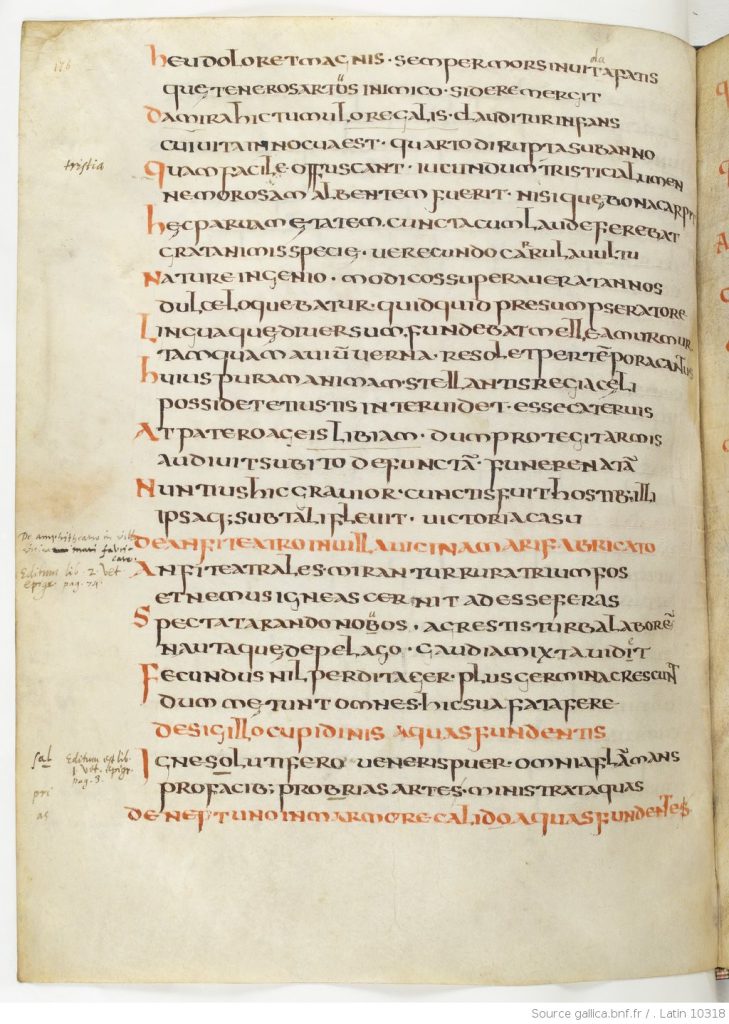I have chosen these two epigrams, firstly for reasons of convenience: in the manuscript they appear immediately behind each other, so they can be seen on one page of the codex Salmasianus (but without the title of the first epigram, which appears on the previous page). On the other hand, they represent two different genera of epideictic epigrams, which are also represented in inscriptions: that of an ecphrasis (of an amphitheatre) and that of an epitaphion (of the child Damira). – For the manuscript variants and scholarly conjectures see Happ’s edition, for an interpretation of both epigrams, see my blog ‘Luxurius and the Epigraphic Tradition’.

Anth. Lat. 345 R. Epitaphion de filia Oageis infantula
Heu dolor! Est magnis semper mors invida fatis, | quae teneros artus inimico sidere mergit. | Damira hic tumulo regalis clauditur infans, | cui vita innocua est quarto dirupta sub anno. |5 quam facile offuscant iucundum tristia lumen! | nemo rosam albentem, fuerit nisi quae bona, carpit! | haec parvam aetatem cuncta cum laude ferebat, | grata nimis specie, verecunda garrula vultu. | naturae ingenio modicos superaverat annos, |10 dulce loquebatur, quidquid praesumpserat ore | linguaque diversum fundebat mellea murmur, | tamquam avium verna resonat per tempora cantus. | huius puram animam stellantis regia caeli | possidet et iustis inter videt esse catervis. |15 at pater Oageis Libyam dum protegit armis, | audivit subito defunctam funere natam. | nuntius hic gravior cunctis fuit hostibus illi | ipsaque sub tali flevit Victoria casu.
Translation:
Oh, what pain! Death is always the envy of those to whom great things are predestined, it plunges tender limbs into an evil fate. Damira, a child of royal blood, has been enclosed in this tomb; her innocent life ended in the fourth year. (5) How easily sorrow darkens a cheerful light! One picks a pale rose only when it was once noble! She has filled her short life full of praise: of an extremely sweet shape, a chatterbox with a shy look, she was of a natural gift that exceeded her modest age. (10) She spoke sweetly, whatever her mouth had picked up before, her honey-sweet voice poured out in emanating murmur, like the singing of birds in spring. Now the starry kingdom of heaven has her pure soul and sees her in the crowd of the righteous. (15) But when her father Oageis, who defended Africa with force of arms, learned that his daughter had suddenly died, this news burdened him much more severely than all his enemies; even Victoria wept over this stroke of fate.
Anth. Lat. 346 R. De amphitheatro in villa vicina mari fabricato
Amphitheatrales mirantur rura triumphos | et nemus ignotas cernit adesse feras. | spectat arando novos agrestis turba labores | nautaque de pelago gaudia mixta videt. |5 fecundus nil perdit ager, plus germina crescunt, | dum metuunt omnes hic sua fata ferae.
Translation:
The land marvels at victories in the amphitheater and the grove notices unknown animals here; the peasants whilst ploughing look at hitherto unseen endeavors and the sailor sees a variety of pleasures from the sea. (5) The soil has not lost its fertility, more seeds grow, while all wild animals fear their fate here.